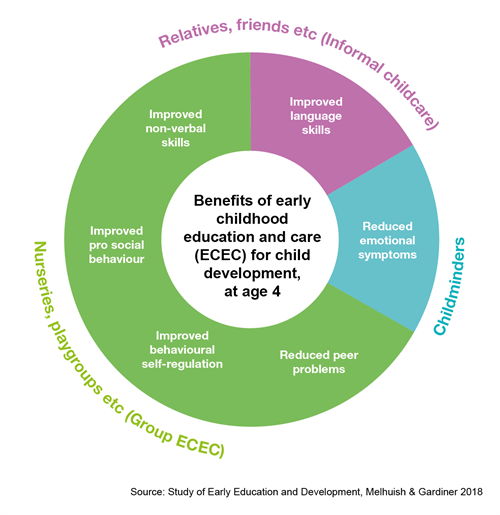Report summary

Aims and Methods
This report presents findings for a sample of 3,930 families who took part in the Study of Early Education and Development (SEED) longitudinal study. Parent interviews at ages two, three and four asked questions about early childhood education and care (ECEC) attended and characteristics of the home environment. Child development at age four was assessed through parent reported socio-emotional development and direct assessments of cognitive development. ECEC quality was measured through observations carried out in 1,000 settings attended by a subsample of children in the study. This report explores whether child development at age four is associated with:
- The amount of differing types of ECEC that children receive aged two to four years
- The early years home environment and the quality of the parent/child relationship at age two to three
- The quality of the ECEC settings that children have attended at age two to four
Key Findings
- Cognitive and socio-emotional developmental benefits were seen to be associated with use of ECEC between ages two and age four. Benefits of ECEC were similar for the most and least disadvantaged families.
- Increased hours per week spent in formal group ECEC (e.g. day nursery, nursery class, nursery school, playgroup) between ages two and four was associated with non-verbal development and better socio-emotional outcomes (more prosocial behaviour and behavioural self-regulation and fewer peer problems) at age four. Benefits for child development were seen across private, voluntary and independent (PVI) and maintained settings.
- More hours spent with childminders was associated with lower levels of emotional symptoms (e.g. nervousness, worries).
- Increased hours spent in informal individual ECEC (e.g. relatives, friends) between ages two and four was associated with language development at age four.
- Attending higher quality formal group ECEC settings was associated benefits for increased non-verbal cognitive development and reduced conduct problems at age four.
- Characteristics of the home environment, including the home learning environment and the parent-child relationship, were associated with cognitive and socio-emotional development at age four. The relationships between ECEC and outcomes were largely independent of the advantages of a rich home learning environment.
